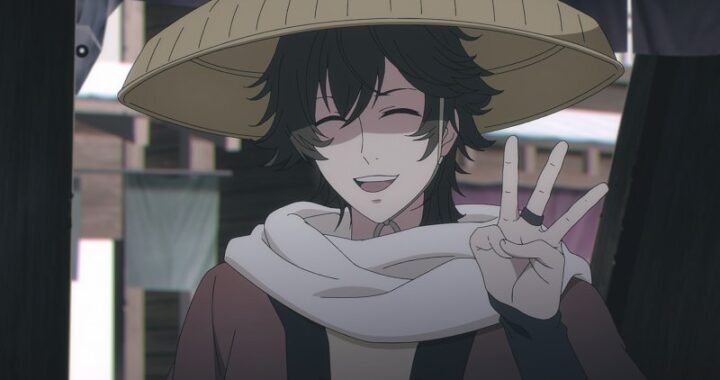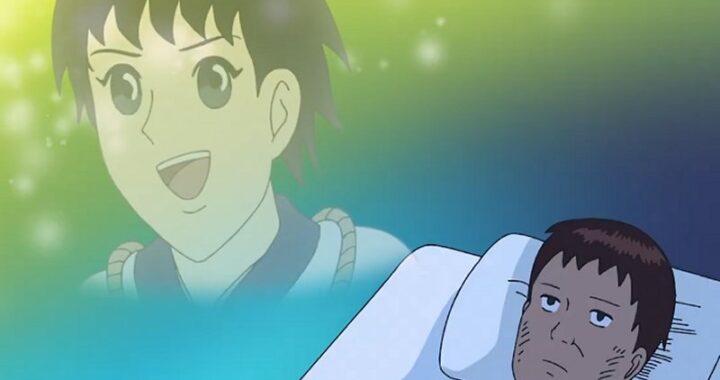You know that a show is supposed to be cute and appeal to the love of cute among a great number of anime fans when you see a cute girl slip and fall on her butt within the first five minutes of the show. So, what better can you do than make a cute anime about four girls who want to form a band and play the Budokan? Think of it as Beck: Mongolian Chop Squad meets Lucky Star.
Okay, that mash-up is just too weird to contemplate. And yet, that is, to a certain extent, what we have here, but with much greater emphasis on the cute part and not so much attention paid to the music. This is a show that does not really need much of an introduction for most anime fans who have paid any attention to what is “big in Japan,” even if they do not make use of the less than savory methods for viewing anime that are common today. Yui Hirasawa, Ritsu Tainaka, Mio Akiyama, and Tsumugi Kotobuki are the four girls in question, who form a band as a school club, the Light Music Club, where “light” only seems to indicate that the music played is not going to be of the types taken seriously by highbrow music critics, such as classical music or jazz. Let us move on to the performances.
Performance notes
If one wanted to be utterly dismissive, one could point out that this is not a show that requires a great deal of talent and ability to do. You have cute high school girls doing cute things that are meant to be seen as cute by the audience, all you really need is a few cute voices that do not grate too much and voilà, you have an appropriate dub. But that would also be a completely dull and lifeless dub, and that’s not what we have here. Tony Oliver, the director and script adapter, is one whose best work can be notable for bringing out unexpected performances from his actors. A few that come to mind are Kirk Thornton and Julie Ann Taylor in Planetes, Kari Wahlgren in Eureka Seven, and Mela Lee in Tweeny Witches. All talented people, but in these performances, we hear things we do not usually hear from them otherwise. From this dub, we get a mixture of an interesting performance not entirely expected from a known name, a solid performance from someone we have all come to expect it from, and some nice work from both a few unfamiliar names and a few familiar names.
The performance that I was expecting to be up to standard and which did not surprise me was Stephanie Sheh as Yui. Yui is a cute and clumsy girl, and Sheh can certainly do cute. She has that down pat. Here, we get a voice that is in some ways a toned-down version of Mikuru Asahina (The Melancholy of Haruhi Suzumiya), but one that is far more suitable and far less grating. She excels in bringing across Yui’s goofy airheaded-ness without making her seem stupid or brain-damaged. That can be difficult at times, considering how Yui seems incredibly simple-minded, being interested only in cute things and food. Sheh is very good at being jittery or clueless, which Yui often is. In episode 6, Sheh does an excellent job of dealing with a vocal impediment that could probably hurt one’s voice if overdone: Yui develops hoarseness from singing too much, and so Sheh has to speak in a rasp for an extended amount of time. She handles it ably and makes it sound convincing.
If Yui provides the goofy good intentions, the scheming and manipulation belong to Ritsu. I personally found Ritsu at the beginning a little annoying, but this is merely a sign that the voice actress, Cassandra Lee, is doing it right. She captures Ritsu’s self-absorption and manipulative tendencies well. I was very impressed by the impassioned speech she gives to Mio in the club room when she recounts their promise to form a band together. The false sincerity was all the more striking when it is later revealed that her entire description of the past was heavily embroidered, bearing only a passing resemblance to the reality. There is also a very child-like quality to the voice she is using, which makes it almost sound like she is an actual teenager. Ritsu provides a strong contrast to Tsumugi, often called by the nickname Mugi. Mugi is a rich girl, but one who is a slight subversion of the normal kind of wealthy ojou-sama which we often see appearing in anime. Shelby Lindley gives her a very proper diction and intonation, much as you would expect from a proper young lady, though without any gimmicks like a fake accent or affected speech. What is notable is that Mugi does not play the power games that wealthy young princesses often entertain themselves with in anime, and thus there is nothing sinister about her and nothing sinister at all in Lindley’s voice. Lindley matches the character well, keeping her sufficiently clueless and intrigued by such “exotic” experiences as being asked whether she would like fries with her fast food meal and having a Christmas party at a friends house that does not involve hundreds of people. Both of these actresses, who are relative newcomers to anime voiceover work, do very good work here.
The unexpected performance for me was Cristina Vee’s Mio. Mio is elegant and lady-like, reserved and restrained in ways similar to Mugi, though without the wealthy background. In her case, the reserve comes from being painfully shy and the elegance comes from a seeming aloofness generated by that shyness. When I think of past performances from Vee, such as Louise from The Familiar of Zero or Nanoha from Magical Girl Lyrical Nanoha, reserved and elegant are not exactly what I think of nor remember from those roles. Initially I wondered why she had not been cast as Yui, which would seem to be a natural fit for her (and Ms. Sheh would have been more than capable of playing Mio). But I was pleasantly surprised when what we heard come out of Mio’s mouth was a deeper, more mature and restrained voice, one that has a certain dignity. Then, when we get to moments of panic and extreme distress (often caused by Ritsu the troublemaker), Vee turns on the fear and terror very well, especially in episodes 5 and 6, where her inability to deal with frightening things and the embarrassment of being the center of attention drive her over the edge at times. It was a performance I enjoyed greatly.
In addition to the four main leads, there are a number of notable supporting players, some of whom become much more important in the later episodes under review here. Very early on, we meet Yui’s younger sister Ui, who is much more mature and composed than her klutz of an elder sibling. Xanthe Hunyh portrays her as a girl who very much has it together, which is difficult to do as she also has to keep her voice cute and similar to Yui in some respects, as they are sisters. She manages this very well. On several occasions throughout, we see Nodoka Manabe, Yui’s classmate and friend since elementary school, who is also a more stable and competent person than Yui. Laura Bailey keeps her sounding like a high school girl, but also infuses her performance with an air of maturity and intelligence, which is exactly what the role calls for.
In these episodes, especially in the second half in volume 2 (alas, K-ON! is being released in singles, going back to a release pattern whose time really has passed for most consumers), the standout supporting performance is from Karen Strassman as Sawako Yamanaka, the music teacher at the school. At first, all we know about her is that she is beautiful and refined, adored by her students and by the other staff. A real lady. We get a voice to match that, one that is always pleasant and pleasing to the ear. Without giving too much away, let us just say that another side to her emerges later in the second quartet of episodes, and Strassman is more than up to the task of adjusting to the different perspective we get on Yamanaka-sensei. There were shades of some earlier performances I have heard from her in the past, a couple of the more memorable villains she has played.
Finally, we have two more girls, freshmen when the main four move on to their second year of high school. One is introduced as a classmate and acquaintance of Ui, Jun Suzuki. We do not get many lines from her, but Michelle Ann Dunphy seemed, to me at least, to have an almost sinister tone in a couple of lines. We’ll have to see if that was just my imagination, or whether there will be a reason for that in future episodes. Finally, there is Asuza Nakano, another classmate of Ui’s, but one she only just meets in high school (they came from different junior highs). Asuza, as voiced by Christine Marie Cabanos, is slightly sad and slightly flat in her tone and delivery. We’ll have to see later if there is a reason for the slight dull tone to her voice.
Overall, K-ON! is a good, but not a great dub. There is life to the performances, especially the main girls and Strassman’s Sawako, who reaches heights of crazed intensity at times. The supporting performances are solid and there isn’t really anything that felt strongly off. About the only time the dub seemed to be straining a bit was at the very beginning of episode 7, in a flashback sequence of Yui and Ui as very young children. There is almost always a problem when adults try to sound like really young children. Hunyh and Sheh try their best throughout the scene, but they can’t quite help sounding a little bit like chipmunks at times. Still, that one slightly off patch aside, the dub is of a good overall standard and one that I can recommend.
Localization notes
The subtitle and ADR scripts diverge on several occasions. The meaning is never seriously altered, though word choices can differ strongly. The sense is almost always retained without any drastic change in nuance. As an example from the first episode:
Ritsu (dub): It’s the useless, clumsy, bad-tempo girl!
subtitles: It’s the spastic, useless klutz!
This is one of the more divergent examples. On many other occasions, the subtitles and dub script simply opt for different synonyms that mean the same thing. Perhaps lip flap or the space available on screen for the subtitles dictated the words chosen for each script. It is not an issue that will concern most viewers.
Insert songs are kept in the original Japanese.
K-ON! Episodes 1-8
Released by Bandai Entertainment Inc.
Dubbed by BangZoom! Entertainment, Burbank, CA.
ADR Dir/Script Adaptation: Tony Oliver
Main Cast:
- Yui Hirasawa: Stephanie Sheh
- Ritsu Tainaka: Cassandra Lee
- Mio Akiyama: Cristina Vee
- Tsumugi Kotobuki: Shelby Lindley
- Ui Hirasawa: Xanthe Huynh
- Sawako Yamanaka: Karen Strassman
- Azusa Nakano: Christine Marie Cabanos
- Nodoka Manabe: Laura Bailey
- Jun Suzuki: Michelle Ann Dunphy





